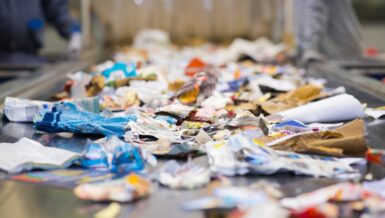With the new European regulations that force textile manufacturers to guarantee the recycling of their products, it found itself with more and more material to process, so they decided to automate part of their production process. Insertega opted for Pellenc ST technology to separate the clothing into different fractions.
For Pellenc ST sorting requirements were to separate 3 fractions
pure cotton, polyester and a mixture of the two
Pellenc ST used a Mistral+ CONNECT DVI optical separator (separation by material and color) in its Full Package version (high-speed conveyor and output box included). This sorter is already known for the separation of other materials such as plastics, wood, paper, cardboard, and beverage cartons (…) and uses the versatility of the latest generation spectrometer with the FLOW DETECTION technology.
Today most advanced recycling technologies offer solutions to make it economically profitable to produce goods from recycled material. PET bottle recycling is now well established, current technologies can now further improve the recycling of PET trays and plastic films. For more than 20 years, Pellenc ST has developed and supplied technologies to increase the recovery of materials to fulfil our customers needs in the circular economy.
For this task, the plant was equipped with a 2800 mm wide machine with a triple channel configuration, thus maximising the efficiency of space, with one machine we can do the work of 3 machines in cascade, with a 1-metre-wide channel and two 800 mm wide channels, processing whole garments to be identified and sorted into different fractions. The greatest challenge of this project was posed by the natural fibres as they require a very high purity of more than 98% for onward recycling. For fibres from petroleum such as polyester, it was also a challenge as the whole garment had to be selected, but as the material is better known to us due to our experience in the plastics sector, purity levels of more than 98% were also reached.
Future Ambitions for Pellenc ST
increase the capacity and the number of sorted fractions
Today, the machine is capable of handling 4 t/h. By implementing our TOP SPEED technology, with the conveyor running at 4.5 m/s, we could increase the capacity by 30% to 40%. Furthermore, the machine can be optionally equipped with a ternary system, meaning more fractions could be sorted by material and colour.

“This project opens the door to a new recycling sector. It is a pioneering application that the market is following very closely and that will pave the way for many other opportunities across Europe. I would like to thank Insertega for letting us work, not just as a simple supplier, but as a technological partner.”
Raúl Núñez – Sales Manager Iberica for Pellenc ST

























